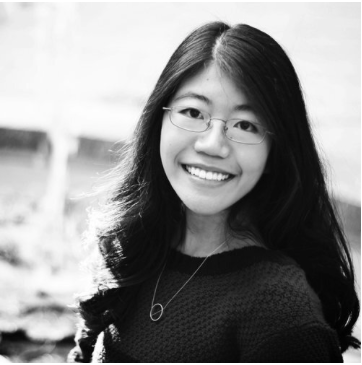 Philadelphia, PA – Acclaimed author Joan He (Descendant of the Crane) is releasing her first new YA novel since her highly successful debut: a beguiling blend of intrigue, mystery, and “cli-fi” (climate science fiction), The Ones We’re Meant to Find (Roaring Brook/Macmillan, May 4, 2021). He will donate $1 to the Ocean Conservancy for every book that is pre-ordered, supporting her commitment to addressing climate change both on and off the page.
Philadelphia, PA – Acclaimed author Joan He (Descendant of the Crane) is releasing her first new YA novel since her highly successful debut: a beguiling blend of intrigue, mystery, and “cli-fi” (climate science fiction), The Ones We’re Meant to Find (Roaring Brook/Macmillan, May 4, 2021). He will donate $1 to the Ocean Conservancy for every book that is pre-ordered, supporting her commitment to addressing climate change both on and off the page.
The novel opens on a world in the spasms of climate disaster. But from within the peaceful confines of an eco-city built for the world’s elite, Kasey Mizuhara has only two things on her mind: how she can use her prodigious intellect to preserve the remainder of humanity, and how she can locate the only person she’s ever felt a true connection with–her recently-vanished sister, Celia. Meanwhile, Celia has awoken marooned on an island with no knowledge of how she got there, and one memory: She has a beloved sister, Kasey, and she must find her. Elegantly weaving between the sisters’ dual perspectives, the mystery of Cee’s whereabouts–and Kasey’s plans–twists into an exhilarating and terrifying exploration of how far people will go to achieve their objectives.
A perfect balance of the melancholic beauty of Never Let Me Go and the most intriguing parts of Lost, “The Ones We’re Meant to Find” is a surprising, compelling, and even profound dive into the nature of memory, the meaning of humanity, and the bonds that we form with those we love, crafted from gorgeous prose that crawls under your skin and sticks with you long after the last page.
“The Ones We’re Meant to Find”
Joan He | May 4, 2021 | Roaring Brook/Macmillan
Hardcover | 9781250258564 | $18.99
E-book | B08BKL8BBG | $10.99
 JOAN HE was born and raised in Philadelphia but still will, on occasion, lose her way. At a young age, she received classical instruction in oil painting before discovering that storytelling was her favorite form of expression. She studied Psychology and East Asian Languages and Cultures at the University of Pennsylvania and currently writes from a desk overlooking the Delaware River. Descendant of the Crane is her debut young adult fantasy. Her next novel, The Ones We’re Meant to Find, will be forthcoming from Macmillan on May 4th, 2021. Learn more at https://joanhewrites.com.
JOAN HE was born and raised in Philadelphia but still will, on occasion, lose her way. At a young age, she received classical instruction in oil painting before discovering that storytelling was her favorite form of expression. She studied Psychology and East Asian Languages and Cultures at the University of Pennsylvania and currently writes from a desk overlooking the Delaware River. Descendant of the Crane is her debut young adult fantasy. Her next novel, The Ones We’re Meant to Find, will be forthcoming from Macmillan on May 4th, 2021. Learn more at https://joanhewrites.com.
Follow Joan on social media:
Goodreads: Joan He | Twitter: @JoanHeWrites | Instagram: @JoanHeWrites
In an interview, Joan He can discuss:
- Why she chose climate disaster (particularly as it pertains to our oceans) as the backdrop to her novel’s events
- How she crafts game-changing narrative twists
- Why quieter, less “relatable” characters make ideal (and rarely seen) protagonists in YA
- How she developed a futuristic world that is still eerily recognizable
- Why she focused on the complex bond between sisters
- How and why she explores the nature of memory, identity, and free will in her novels
An Interview with Joan He
1. How did the early inspiration and ideas for “The Ones We’re Meant to Find” first begin to occur to you?
The inspiration came in two parts. First, I dreamed about a girl diving into the sea, clearly searching for something. As I tried to figure out what that something was, I thought back all the YA dystopians I read when I was a teen. Books such as The Hunger Games first introduced me to the trope where the older sibling saves the younger one. What if, I wondered, the girl in my dream was searching for her sister? And what if I shook things up so that the younger sibling didn’t need saving?
2. Your characters are nuanced, complex, and (at times) morally ambiguous. What traits are most important to you when developing your characters, and why?
As much as we want to believe we’re all special, I think it’s more fascinating to approach characters with this psychology finding in mind: we’re actually far more similar than we are unique. For the most part, we want the same things. To be loved for who we are. To fit in. And when put into high pressure situations, we can betray even our most tightly held values. So before firming up traits, I like to focus on actions. How much agency does a character think they have? How much are they willing to exert it? Are they actually being true to themselves when they act? Or, as in the case of Milgram’s experiment, are they flipping switches and pushing buttons because of their environment, upbringing, or some other situational factor outside of themselves?
3. “The Ones We’re Meant to Find” crafts a unique futuristic world, develops an utterly intriguing mystery, balances complex themes like the nature of memory and identity, and still manages to subvert readers’ expectations for how the story might play out. There are so many narrative elements in play here — how do you approach writing stories that are so multifaceted, but tightly woven?
To keep a story focused, I rely heavily on knowing my midpoint from the start. In fact, the best way for me to test the viability of a premise is to see if I can turn it inside out halfway through. Once I have my “tent-pole”, the rest of the pieces either have to play a role in leading up to that event, or fall out from it.
4. Do you imagine that we’ll actually reach a state of climate disaster as portrayed in the novel?
Some events in the novel are certainly exaggerated beyond what is scientific to make a statement. But as the Covid-19 pandemic has shown us, it’s really hard to get people to care about an invisible enemy that affects people unevenly. The same could be said for climate change and pollution. How many US residents, for example, are aware of the mask wearing culture in China that existed pre-pandemic due to pollution caused by China’s robust manufacturing landscape (which exists, largely, to supply many of our needs)? So while I don’t think we’ll arrive at the exact destination portrayed in the book, I do think the road to some sort of tragedy is already paved.
5. What do you want readers to take away from your novel?
I think it’s easy to say “live life to the fullest” as a throwaway, uplifting phrase. But none of us exist in a bubble; our most innocuous actions can and do affect other people. There’s no avoiding this, and the book isn’t prescriptive, but I hope it helps readers consider the complex connections between all of us, be it as individuals, siblings, or nations.

A former award-winning journalist with national exposure, Marissa now oversees the day-to-day operation of the Books Forward author branding and book marketing firm, along with our indie publishing support sister company Books Fluent.
Born and bred in Louisiana, currently living in New Orleans, she has lived and developed a strong base for our company and authors in Chicago and Nashville. Her journalism work has appeared in USA Today, National Geographic and other major publications. She is now interviewed by media on best practices for book marketing.

